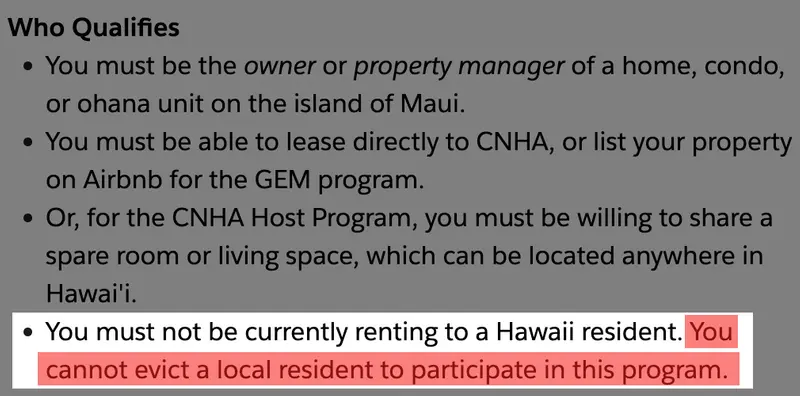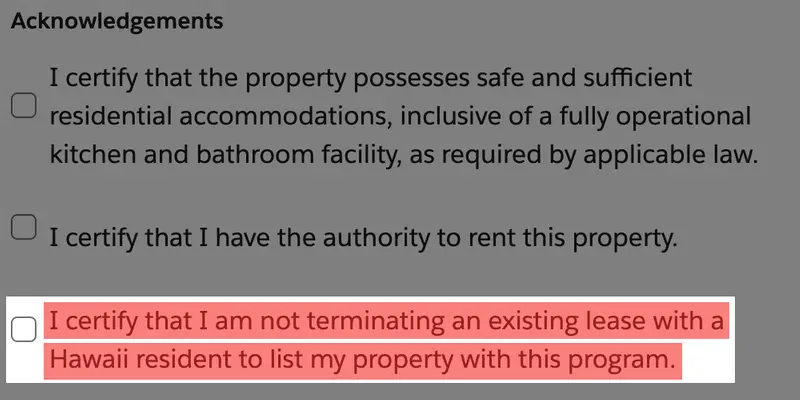This article was prepared for ProPublica’s Local Reporting Network in partnership with Honolulu Public Beat. Subscribe to Dispatches to receive such stories as soon as they are published.
When the federal government stepped in to provide housing for survivors of the devastating 2023 fires on Maui, officials said they did not want to raise rents or give landlords an incentive to evict tenants to get lucrative government contracts.
On paper, the plan sounded good: It would rely on finding vacant rental properties and second homes, in line with Federal Emergency Management Agency policy.
But new reports show FEMA didn’t take basic steps to ensure that happened: While the agency signed contracts with private companies to identify homes they could rent to survivors, it didn’t prevent them from signing over properties that were occupied long-term residents.
Without such guarantees, and with FEMA offering rates significantly higher than what residents typically pay each month in rent, some landlords evicted tenants and housed fire survivors for more money. Local economists warned that rents could rise on the small island and that Maui’s housing crisis could worsen — both of which have happened, Civil Beat and ProPublica have found.
A examining the impact of emergency housing programs on Maui’s economycommissioned by FEMA itself, it found that the average rent has increased by 44% since the beginning of 2023. until June 2024. Although the researchers concluded that this was primarily due to the loss of large numbers of homes in the fires, they said that anecdotal evidence and hundreds of complaints to government agencies show that “the behavior of some landlords may have changed” in response to FEMA’s high prices, which led to higher rents and displacement.
Reports from Civil Beat and ProPublica confirm the researchers’ findings. Tenants, housing advocates, government officials and property owners say landlords have jacked up rents and that residents have been pushed out by wildfire survivors or others who will pay more.
“It seemed pretty clear that they were creating a reward system for evicting long-term residents,” said Justin Tyndall, an associate professor at the University of Hawaii who wrote report warning that FEMA’s housing program could result in the displacement of residents. “If you could just find a way to get your tenant to leave, then you would be eligible for this huge rent payment from FEMA. So it’s no surprise that people are finding creative ways to make that money.”
When it launched the program, the agency instructed potential contractors to rent out the space.”not available to the general public.” David Greenberg, head of Parliament LLC, one of the companies hired by FEMA, said in an email that the agency made it clear that renting property from landlords who evicted tenantseven if the company didn’t know about it, parliament would lose the contract. He said his staff looked for properties being advertised as vacation rentals and were instructed to “ask the owners and property managers directly if there are any renters.”
FEMA officials told Civil Beat and ProPublica that the 1,362 properties in the agency’s housing program were mostly vacation rentals and second homes, though they did not know exactly how many. They also said FEMA policy allows flexibility; because housing on the island was limited and their program could not meet the needs of survivors with only vacation rentals, the agency allowed any property owner to sign up as long as the home was safe and ready for occupancy.
One non-profit organization that also rents out properties has been more active in trying to prevent landlord speculation. The Native Hawaiian Development Council, a prominent local nonprofit, operated the only non-governmental leasing program after the fires. At st online application for her program, property owners had to certify that they were not evicting anyone in order to house survivors. They had to state which property they were renting out and whether it was furnished. And when the landlord said the property was a short-term rental, officers tried to verify that with property tax records or Airbnb listings.


credit:
Obtained by Honolulu Civil Beat and ProPublica. Featured by ProPublica.
Also, if the landlord said the property was a long-term rental — the type of property FEMA hoped to avoid — CNHA asked for previous leases and the names of previous tenants so staff could make sure no one was displaced, according to Skye Kalealani Razon-Olds. , which oversees non-profit emergency housing recovery organizations. When a non-profit was renting long-term, it offered lower rates than for vacation rentals. In contrast, FEMA said it typically sets its rates competitively with what tourists typically pay.
“We knew the areas that are typically used for short-term rentals, we had more in-depth conversations with people, and we were prepared to say no,” Razon-Olds said. “Most of the things we went for were short-term rentals, so we knew we weren’t going to move somebody.”
Bob Fenton, FEMA’s regional administrator in charge of disaster relief after the fires, acknowledged that the agency did not require contractors to avoid long-term leases. “It’s not something we’ve put into the contract: it has to be in the vacation rental market,” he said. He said he was not aware of FEMA contractors taking the steps that CNHA did, but added that the agency is open to suggestions on how to improve the program. “These are all ideas, recommendations, lessons learned that we will take into account while continuing to work here,” he said.
In practice, FEMA contractors mostly had to make sure that their housing efforts didn’t force landlords to evict people. Greenberg, the parliamentary leader, said his company refused to work with several landlords who tried to evict current tenants. “If we caught the slightest bit of indecency, we’d move on to the next division.”
However, Art online application that the company, created for property owners, asked nothing about the tenants or the type of rental – only the address, the number of bedrooms and bathrooms, if available, and additional information, such as whether pets were allowed or whether it was accessible to people with disabilities .
In response to accusations that companies like his were more focused on speed than property inspections, Greenberg said: “I’m proud of the balance we’ve maintained in ensuring that all of our properties are compliant, with owners are treated with respect and those who survived, who live in our parts were received with dignity.” He did not respond to a question about whether his employees were interested in the previous tenants.
Fenton acknowledged that the agency typically doesn’t know when someone has been evicted until after his contractor has rented the space. Fenton said that in “fewer than 10” cases, it was found that the landlord had improperly terminated the lease in order to participate in the FEMA program. It kicked out those properties.
Parliament was one of three companies hired by FEMA to manage the property; representatives of the other two, Lima Charlie Inc. and Aesthetic Home Investments, did not respond to questions from Civil Beat and ProPublica.
Two landlords who rented to long-term tenants before the fires told Civil Beat and ProPublica that FEMA contractors spent little time inspecting their properties. Hank Rapoza, a Maui real estate agent, said he approached Parliament in December or January about renting out his two-bedroom apartment in Wailea. He said the representative asked if the unit was vacant and didn’t inquire further when he said it was. The company offered him $7,500 a month, much more than the $3,500 he was taking previously.
“$7,500 was more than fair, so I said I’d take it,” Rapoza said. “After I said that, they sent me the lease three hours later, which I signed. That’s how fast they were.”
Stephen Clark, another landlord, said signing up to the program was extremely easy. After the fires, he listed a newly renovated three-bedroom house in Makawao, asking $4,000 a month. In November, he said, he was eating tacos from a food truck in Kahului when a Lima Charlie representative called and offered him $8,000 a month. Clark said no one asked about the previous tenants; the rep just wanted to know if the seat was empty. Clark said yes. “They took my word for it,” Clark said. They agreed before he finished his lunch.

